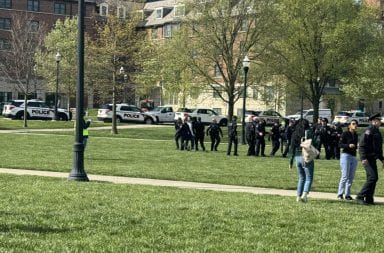New Hampshire is a rather unusual state. In the past, it was Republican-leaning in the middle of the Democratic stronghold of New England. It is the only state in the region that gave George W. Bush any electoral votes in 2000. In 2004, it was the only formerly red state to turn blue. In other words, it is not a state where the residents tolerate government failure, or for that matter, any government at all.
The libertarian mood of New Hampshire is well-known. The state motto “Live Free or Die” confirms that the government is not well-received in the Granite State. New Hampshire does not even have a state income tax or a state sales tax. All of this led the rather radical libertarian group known as the Free State Project to choose New Hampshire as its destination in their quest to build a government-free libertarian utopia. New Hampshire is hardly a representative state, yet every presidential election year, the New Hampshire primary has a painfully powerful role in deciding the nominees of both major parties.
Traditionally, New Hampshire has held the first primary in the U.S. during every election year. Residents of New Hampshire are bellicose in their defense of this tradition, going as far as writing it into their state law. The momentum factor, which has come to play a major role in recent years, usually means that Iowa and New Hampshire will decide the nominees or at least whittle down both parties’ candidates to a few.
Given that New Hampshire is way too libertarian and way too small to reflect what the majority of Americans actually think, the New Hampshire primary should be moved back and replaced with a more representative and larger state. Unfortunately, tradition always seems to dictate what people think is proper. More representative states, which would better embody the thoughts of the nation, have been left out and have lost all but a bit of influence in deciding the nominees due to the momentum gathered from Iowa and New Hampshire.
The vigorous defense of tradition in the electoral process was demonstrated perfectly when Michigan moved its primary election up to Jan. 15, well before Super Tuesday. Both parties were irate. The Democratic Party took away all of Michigan’s delegates to their convention and the Republicans stripped them of half. This ensured that the rather large swing state will have absolutely no influence in picking the Democratic nominee and very little clout when it comes to the Republican nominee.
It is unfortunate that tradition seems to rule the practices of both of America’s major parties. If a more representative state such as Michigan (or Ohio for that matter) held its primary first, we would have a much better idea of what the American people are thinking. Unfortunately, we only have an idea of what the anti-government population of the state of New Hampshire is thinking and because of the momentum factor, New Hampshire might once again pick the nominees from both parties.
Brian Murphy is a senior in political science. He can be reached at [email protected].


